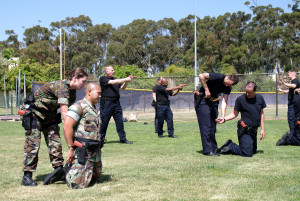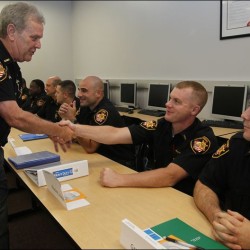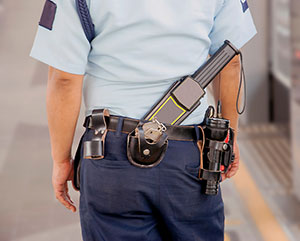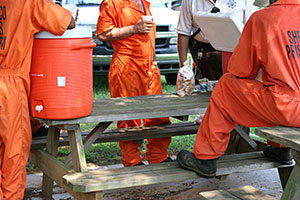Candid Advice About First Year of Probationary Training

No matter who you are with in your first-year probationary training as a law enforcement or correctional officer cadet, you are first and foremost responsible for yourself. So, who (and how) you wish to be as a law enforcement official is a reflection of your character and professional reputation. Probationary training and development serves to build upon the persona with which you are already equipped, even if it challenges pre-existing qualities. Perhaps strengthening some perceived weaknesses is on the menu...
Whether performing duty on the streets or within the confines of correctional institutions, people always notice your conduct. ALWAYS. However rhetorical it may be, those who serve in the capacity as a law enforcement officer are consistently scrutinized. If this has not dawned on you yet, you may have been snoozing under a rock. Or, perhaps you are the rock (not implying virtue of strength here, either). No B.S., don't delude yourself!
Before you started on this journey, you should have practiced self-discipline and had the wherewithal to presage a SAFE, selfless, and challenging career. If not, don't fret; resources are available to you. And, we can always implement changes. The following points are to be practiced throughout your career, not only in probationary training mode.
Important Tips to Follow During Training and Beyond
Field Training Officers
Field Training Officers are certified and assigned to provide professional insights and strict guidance. Glean, glean, glean...all the time. Lessons derived from those far more experienced abound and should be valued like gold bullion. Collect these nuggets of wisdom and cherish them all. The likelihood you will draw upon them is high. These folks are walking, armed Research & Development results.
Akin to the adage "It takes a village to raise a child," so, too, does a cadre of seasoned officers. Senior staff have inherent value in molding a peace officer cadet during probationary months. Ample information is given. Periodic tests are administered, the results of which determine if you are listening/comprehending. Certain training blocks (categories implicit in what makes a sound and able-bodied officer) receive more attention, time and labor than others.
FTOs are responsible for seeing you through the probationary/training modules. In situations where a cadet is performing dismally, FTOs are equally charged with ferreting out the weak links. However, your destiny is in your hands, not theirs. It is up to you to prove yourself worthy of the badge.
Officer Training
Underscored by the omnipresence of danger, officer safety is a paramount ingredient you will practice well-beyond the probationary period! Therefore, be prepared to exercise the principles of OFFICER SAFETY no matter how calmly your shift transpires.
As an officer, your academy training has indoctrinated you to exercise due care and implement a heightened awareness of your entire surroundings. In correctional institutions, you will have a delineated and barriered playing field, advantaged by the factor of confined/secured individuals for most of each day.
Out on the more expansive territories of city/county streets, LEOs may find it more taxing, given the seemingly constant movement of people and vehicles. Whereas correctional officers have the aforementioned benefit of sanctioned control among its charges, peace officers working the streets are challenged with performing among people with liberty, operating on a vast landscape.
Assume the bad guys/inmates can discern a rookie from a veteran. They can! With that said, do not fall prey to anyone seeking to test you. Follow academy training principles, command presence, self-control, self-restraint...and cues from senior staff.
Physiology
Whether consciously or subconsciously, hyper-vigilance becomes an essential element in your repertoire of tools and skills to stay safe...pre-empting danger to yourself and others. Ironically, one of those skills is maintaining your body's physical and emotional stability. Scientific studies prove time and time again that hyper-vigilance in law enforcement can be detrimental to health conditions. A paradox. Striking an equitable balance is the goal here, so take note for your own good, and the good of others. This material will be examined and expounded in the near future, here on correctionalofficer.org.)
Don't assume since you are new to the business, young, and virile that you need not scrutinize your health. You do, throughout your life course. It requires more diligence as we age. You wear a badge on your chest, not the letter "S"!
Interpersonal Skills
How you act and interact with the populace becomes a benchmark by which people will trust you, involve you, and validate your integrity and authenticity. Again, be mindful of and exercise great self-control and self-restraint techniques, and you should be fine. These can save lives, both yours and others. Frankly, if you easily cave when your buttons are pushed, you may have to take a crash course on how to grow thick skin. Be prepared, because badgering peace officers is common!
Pesky Rules
Notwithstanding your assigned Field Training Officer and all that he/she is responsible for instituting (daily and across several months), there exists a standard of training protocols, rules/regulations, and operational tenets. And, yes...there are statutes which describe what peace officers can and can not do. Don't let your ego trip you up! Being in a business which seeks compliance surely equates to setting the example as a compliant law enforcer.
You may not agree with some of the rules and regs, but you are expected to comply with each.
"I Did It My Way"
Frank Sinatra had enough experience when he crooned these lyrics. You do not...yet. You are new and therefore in a position to learn. Not teach, learn. To make the point less crass: you are being paid to learn.
However, if you are of the mindset to affect change (ie.: repealing and/or rewriting rules/regulations), maintain that focus with diplomacy and in a chain-of-command context. It would be wise to informally discuss such interests with an equal subordinate or a first-line supervisor. Bear in mind, you are on probation, so refrain from re-inventing the wheel...until a later plateau in your career.
Veterans
Your assigned FTOs will undoubtedly share their life and professional experiences with you. Listen acutely! Remember, trainers were once in your shoes. In no way is it suggested that you mimic any other human being -you are here to mature your own persona- however, in this particular case, mirroring the behavior of someone with years of experience will suit you well. Nuggets of wisdom are for the taking. Find fortune in being a beneficiary of professional advice and vast supplies of knowledge.
Beyond Cadet Probation
Sharing information regarding the ins-and-outs of law enforcement is a forward-paying process. The day may come when YOU will be positioned to train new cadets. These moments serve as another rite of passage, responsible for shaping new officers. Therefore, strict attention to what is offered you formulates the basis for the requisite credentials as a future trainer.
Cadets and Component Parts
As a probationary cadet , you are one spoke in a huge wheel. Weakening and/or bending of one spoke places undue burdens on all other component parts. With this analogy, both your physical and emotional integrity must be harnessed and galvanized as best possible. Although most criminal justice entities espouse sound welfare and finite conditioning, it is primarily up to you to steadfastly ensure these important ingredients. You may be cajoled to "work out" but only you can exercise your body and mind.
Morality/Ethics Tests
Even lapses in moral and/or ethical reasoning must be considered. Just because you possess a well-rounded personality does not mean you ought to oblige every request. In prison settings, inmates desperate for items otherwise considered "contraband" may appeal to your pleasant demeanor by flattery, etc. Street cops must abstain from granting special favors, no matter the relations. Rules forbid such activities, bolstered by the ethical and moral tenets you vowed to uphold during your swearing-in ceremony.
Adhere to regulations which prohibit circumstances that challenge your integrity. Falling prey to "users" with nefarious self-interests is a surefire way to get terminated and/or charged criminally.
Know-It-All Types
A commonality in law enforcement (street cops and correctional officers) is having some prior experience from time with a former agency. Regardless, you will likely be subjected to another "probationary" period, including field training. Unofficially, no rule admonishes against talking about prior experiences. However, "I was always trained to do it this way..." only draws contempt and impatience from your trainer and colleagues. Informally, phraseology directing you to refrain from flashback-like experiences should be heeded.
Like any corporation, a mission statement defines the organization. The same is largely true in criminal justice circles.
Assessing Lessons
Pay strict attention to what and how you are being trained. Internally, make comparisons after your tour of duty is concluded. If applicable, blend instructions given in the past with training information you are being fed currently. Where logical, mesh details and correlate principles to guide your career. You'd be foolish to not consider some independence as a cadet. After all, being a peace officer comes with tremendous autonomy.
Arrogance
Don't do stupid things and you won't be looked upon as a stupid peace officer. Simple! Follow guidelines and protocols and you will receive little-to-no backlash from administration. No matter the circumstances, respect others and you can justly expect respect. If respect for you does not materialize, do not take it personally, especially when you know you catered to an individual professionally and respectfully. Self-control and self-restraint are life- and career-savers. In the absence of respect, you can hold your head high and wear your badge with dignity. Trainers are always observing cadets' reactions. Don't fall prey!
Presence and Appearance
Don your uniform with pride, creased and accordingly adorned with agency-authorized hardware. Whether you are prior military or not, attire yourself in custom fashion. You were taught this in the academy. Inspections were common-place. Maintain good habits. Buff your mirror(s)! After all, no one likes a disheveled peace officer. A sloppy cadet will earn poor ratings, deservedly.
Checks and Balances
A checklist will serve as a pseudo-parent. Uniform appearance according to specifications? Check. Punctual reporting for duty? Check. Interacts well with the colleagues, administration, and the public (including inmate populace)? Check. Studied for cadet training-block exams? Check. You get the point.
Performance Records
Commonly called a DOR (Daily Observation Report), your every move and utterance is being assessed. Your assigned FTO is responsible for placing check marks in hundreds of tiny boxes, supplemented with typewritten narratives and physical examples of work done throughout the shift. The reader, usually a ranking officer who heads the training unit, is the recipient who gets to see "what you look like on paper."
Like a celebrated artist, paint a pristine picture. Much like an artist, your signature is applied to each and every report, whether you debate some remarks/scores or are in full agreement with your FTOs assessment of your performance. One solid piece of advice to take heed with regard to DORs: These records are a permanent part of your personnel jacket. AND, they become accessible by attorneys and the courts to discern your caliber of peace officer. Don't look poor on paper, and open up the door to questionable performance. Get it right...from the beginning! It won't feel pleasant to be ridiculed on the stand. Nor will you be able to defend against recorded deficiencies you could have (should have) handled appropriately.
How badly do you wish to shine?
All government levels of law enforcement (city, county, state, federal) have periods of probationary status. Typically, it is during this probationary period- which typically matures at the end of one full year of service- when deficiencies and strengths in performance are identified. Given the rather enormous investment in both time and expense invested in you, stipulated weaknesses are defaulted to remedial training.
The hard truth candidly shared is that failure to pass the fallback of remedial training often leads to termination. In the event this misfortune occurs, a serious question arises: Did I give it my all? To avoid having to ask such a difficult question, why not concentrate on this question: Am I giving my best effort? If you got as far as "probationary cadet," the question is rhetorical and the answer should be an obvious one.








